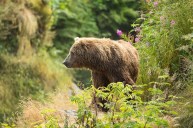The hiker who survived a grizzly bear attack in Grand Teton National Park this week opened up about the incident, chalking it up as "a case of wrong place wrong time." In a social media post, Shayne Patrick detailed how he found himself in the situation on May 19 and how he survived.
Patrick explained that the attack happened while he was walking back to his car after about an hour and 15 minutes on Signal Mountain trail. He said he knew his wife would be worried about him if he stayed out any longer, so he walked quickly to the location pinned to his GPS.
"I had a really uncomfortable feeling. I was breaking branches, singing, and talking to myself aloud," Patrick wrote. "These are some things that can help prevent a 'surprise encounter' with a brown bear." As Patrick walked through a heavily wooded valley, he noticed a brown bear cub, about 50 to 70 yards away, running up the hill.
"I knew this wasn't good, I unholstered my bear spray and saw the mother bear charging. I stood my ground, shouted, and attempted to deploy the bear spray but as I did she already closed the gap," he said.
The Grizzly Bear Attack
As the mama bear attacked, Patrick turned his back to her, lay prone on the ground, and wrapped his hands around his neck to protect his vitals. "I screamed. She then turned, stepping on my back." The bear wasn't done. "She bit one of my legs, picking me up and slamming me on the ground multiple times. She bit each leg from my buttocks to my inner knee about three times each," he wrote.
After she bit his butt the last time, he screamed, which directed the grizzly bear's attention to his head. He said he thinks she went in "for a kill bite." Fortunately, he still had his hands around his neck and he had never let go of the bear spray. "As she bit my hands in the back of my neck she simultaneously bit the bear spray can and it exploded in her mouth. This is what saved my life from the initial attack," Patrick said. He added that the bear ran away after biting the canister, so he had time to run in the opposite direction.
Patrick, a disabled Army veteran who survived mortar and IED attacks while serving in the Army, called the grizzly bear attack "the most violent thing I have ever experienced."
View this post on Instagram
What Happened After the Attack
With some distance from the bear, Patrick got close enough to where he could text his wife. He sent her a one-word message: "attacked." In response, she called back and while they talked, he applied improvised tourniquets to his legs. Then, he called 911 and waited for a helicopter to find him.
"At this point, I knew that I didn't have any arterial bleeds and I just needed to slow the bleeding in my legs," he wrote. "I laid alone in the woods gripping my knife with my back to a tree just hoping the bear wasn't to return."
By the time the helicopter found him, he had to crawl so the search and rescue crew could see him better. "At this point, my legs were not really working," he added. When one of the crew members found him, he said he was alert and responsive. Then, they field-dressed his wounds and flew him to the parking lot, where an ambulance was waiting to transport him to a nearby hospital.
What Saved His Life
In addition to his Army medical training and the emergency medical team, Patrick credited his bear spray for saving his life. "Though I am not sure if I got to spray any at the bear, having it on me and keeping it in my hands while protecting my vitals 100% is the only reason I am telling my story now," he said.
According to a news release, the National Park Service said they would not be pursuing the bear, saying its behavior was a normal reaction for a surprised bear. Despite his injuries in the grizzly bear attack, Patrick seems to agree with that sentiment. "I love and respect wildlife," Patrick said. "Anyone who knows me, knows this about me. In fact, the second thing I said to the park rangers was please don't kill the bear, she was defending her cub."




